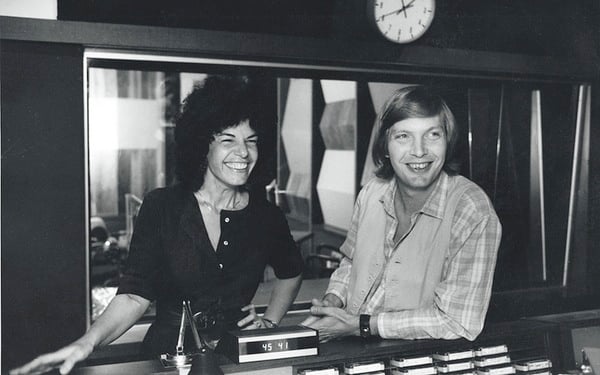Susan Stamberg and Bob Edwards in 1979. “We learned to use our differences,” he says. Photograph by Dennis Brack
Professional marriages are even harder than the romantic variety, and the divorce rate is higher. Mine survived a tepid honeymoon to blossom into a rewarding on-air partnership and an enduring friendship.
Susan Stamberg was a writer and tape editor for NPR’s All Things Considered when the program debuted in 1971. In those days, women worked mostly behind the scenes. But when Susan filled in as cohost one day in 1972, the phones lit up. She was a sensation—intelligent, engaging, honest. She was also way out there, reacting to a guest’s humor with a laugh that defied description. By sheer force of personality, Susan became the first woman to anchor a nightly national news program.
You’d think a guy like me who spent his life loving radio would recognize a natural radio personality. Not Mr. Prig. I was in shock, wondering what this woman was doing on a news show.
There was more, of course, including jealousy. When I became cohost in 1974, Susan had been carrying the network on her back and was treated accordingly. We were supposed to be a team, yet all the attention was going to her. She also made more money (though not nearly what she was worth).
Jealousy likely would have doomed our partnership had not other factors come to the rescue. Susan and I were successful. Whatever tensions were in the air, we kept them off the air. Susan was my partner, and the professional thing to do was to make it work. She was also winning me over. In fact, I discovered I’d been learning from her.
Susan changed the very way I sound on the air, talking with listeners, not at them. I learned to turn an interrogation into a conversation. The most important thing I learned was how to extend my personality on the air. One can’t host a program by sounding like a newscaster. A host has to sound like someone you want to have over for drinks.
We learned to use our differences—artsy, Jewish female from New York, newsy Catholic male from Kentucky. We played to each other’s strengths and covered each other’s weaknesses. I fed her straight lines knowing she’d sell the punch line. She laughed at my jokes.
Susan wrote the scripts containing excerpts from listeners’ letters. If the person was angry about something, I tried to vocalize the anger. Susan was great about parceling out zingers for me while retaining a few for herself.
Listeners got in on the act, too. We had what we called contests—the only prize was getting one’s entry read on the air. We asked people to send us good advice they’d received. We requested suggestions for what China’s Deng Xiaoping should see when he visited America (a hot tub in Marin County, Billy Carter’s gas station in Georgia). When scientists decided to add a “leap second” to correct the official clocks, we asked what listeners would do with their extra second. One said she’d have second thoughts.
This was interactivity before online chat rooms. Many of the ideas came from Susan. She was always looking for relief from the stories on inflation and partisan politics. Susan loved her audience. Five minutes before the program, she’d powder her nose and apply lipstick to greet the listener who could see her only in the mind’s eye.
I learned that working with pros helped me become a pro. Working with slugs only makes you resemble other slugs.
Our partnership lasted five years, ending when I left to host Morning Edition. I’m sorry that poor woman had to put up with a cohost who was still growing up. She was much more patient than I deserved and classy enough not to remind me of it very often.
This article appears in the November 2011 issue of The Washingtonian.
Bob Edwards is host of The Bob Edwards Show on Sirius XM Radio and Bob Edwards Weekend, heard locally on WAMU. This article is adapted from A Voice in the Box: My Life in Radio, copyright © 2011 by Bob Edwards, published by the University Press of Kentucky.


















